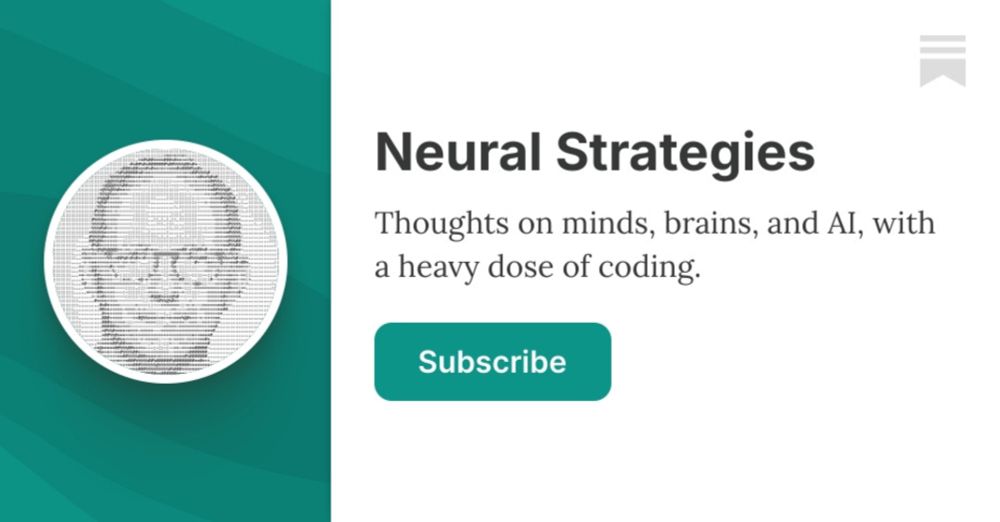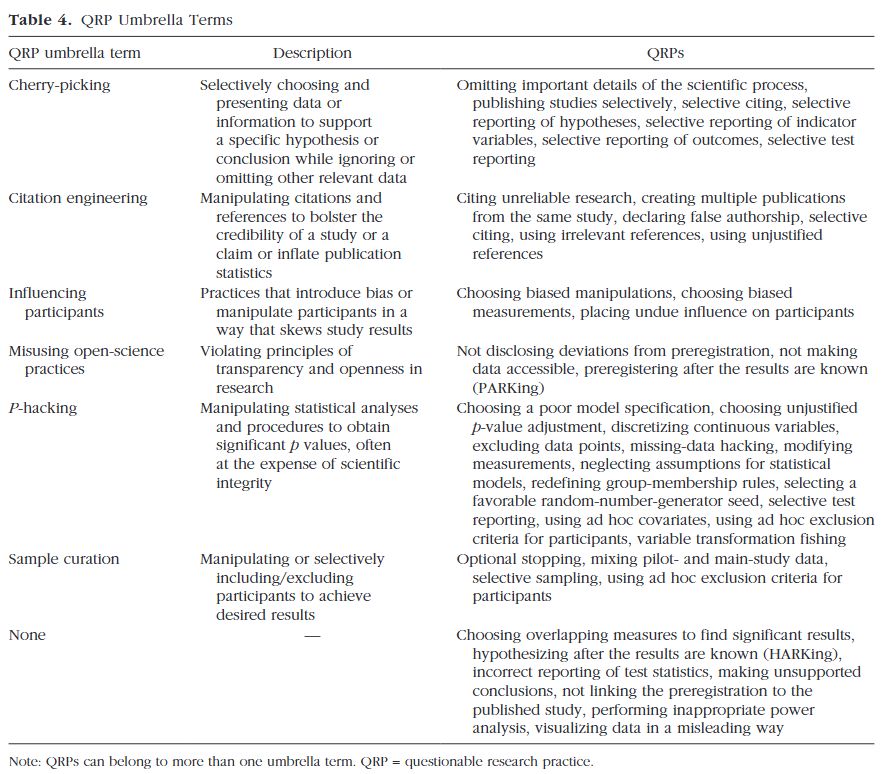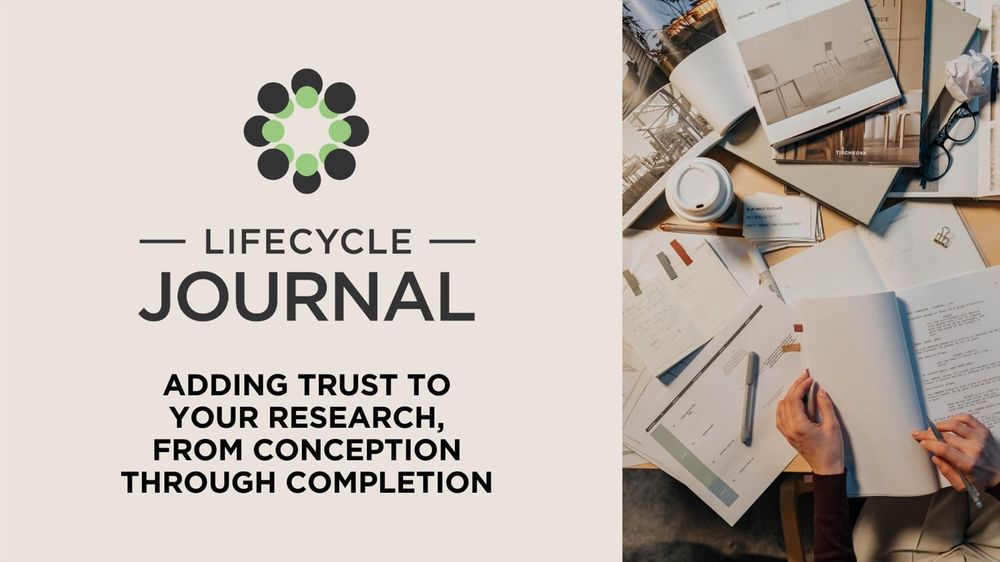The making of this week's #TidyTuesday chart recorded with {camcorder} in #RStats 📹
23.10.2025 15:04 — 👍 73 🔁 8 💬 3 📌 1

International Team Constructs Definition, Inventory of Questionable Research Practices
An international team of researchers has proposed an overall definition of QRPs and published a comprehensive list of them—as well as ways to detect and prevent them.
An international team of researchers has proposed an overall definition of questionable research practices (QRPs) and published a comprehensive list of them—as well as ways to detect and prevent them. @nagyt.bsky.social @amathia-deluxe.bsky.social #Psychology
22.07.2025 16:19 — 👍 13 🔁 5 💬 1 📌 1

The structure of a good software test
Better Code, Better Science: Chapter 4, Part 2
The structure of a good software test - the latest in my Better Code, Better Science series. russpoldrack.substack.com/p/the-struct...
22.07.2025 15:32 — 👍 5 🔁 2 💬 0 📌 0
🚨New paper out in AMPPS! proud to be part of this one, another solid product of @improvingpsych.org✨
We mapped the grey zones of psychology’s research culture through a consensus process. Ever wondered, “Wait... is this a questionable practice?” You’re not alone: doi.org/10.1177/2515... #OpenScience
14.07.2025 10:34 — 👍 19 🔁 7 💬 0 📌 1

🚨 New study alert! We're excited to share our "Bestiary of Questionable Research Practices in Psychology" in #AMPPS. We tackle the credibility crisis in research by defining, collecting, and categorizing QRPs using a community consensus method. 🧵#OpenScience #QRPs @psychscience.bsky.social
11.07.2025 08:52 — 👍 40 🔁 18 💬 1 📌 4

Bestiary of Questionable Research Practices in Psychology - Tamás Nagy, Jane Hergert, Mahmoud M. Elsherif, Lukas Wallrich, Kathleen Schmidt, Tal Waltzer, Jason W. Payne, Biljana Gjoneska, Yashvin Seet...
Questionable research practices (QRPs) pose a significant threat to the quality of scientific research. However, historically, they remain ill-defined, and a co...
🧌This "bestiary" can be a vital resource for researchers, educators, and reviewers to recognize, understand, and mitigate QRPs, ultimately raising the standard of psychological research. Read the full article here: journals.sagepub.com/doi/10.1177/...
11.07.2025 08:52 — 👍 27 🔁 15 💬 1 📌 0
Aleksandrina Skvortsova, Samuel Alarie, Katherine Graves, Lukas K. Sotola, @davidmoreau.bsky.social , @evarubinova.bsky.social
11.07.2025 08:52 — 👍 2 🔁 0 💬 1 📌 0
🙏Huge thanks to all co‐authors: @amathia-deluxe.bsky.social , @mamsmandrill.bsky.social, @lukaswallrich.bsky.social, Kathleen Schmidt, Tal Waltzer, Jason W. Payne, Biljana Gjoneska, @yashvin.bsky.social, @andrewang.bsky.social, Daniel Scharfenberg, Gabriella Tyson, @ufangyang.bsky.social, ...
11.07.2025 08:52 — 👍 3 🔁 0 💬 1 📌 0
😮💨But there's hope! Our study highlights key preventive measures to avoid QRPs: transparent reporting, preregistration, blind data analysis, following best practices, and performing robustness checks. These foster research integrity!
11.07.2025 08:52 — 👍 3 🔁 0 💬 1 📌 0
⚡Why should we care? QRPs pose a substantial threat to scientific conduct and quality. They can lead to biased statistical error rates, reduced replicability & reproducibility, biased effect size estimates, and inflated credibility, undermining research trustworthiness.
11.07.2025 08:52 — 👍 3 🔁 0 💬 1 📌 0

🕵️How detectable are QRPs? Our study identified 18 QRPs detectable directly from a publication📰, while 19 more need supplementary info like preregistration or open data. We found 97 unique clues🔍! This info can serve as a checklist for human reviewers & prompts for AI risk assessment.
11.07.2025 08:52 — 👍 3 🔁 0 💬 1 📌 0

☂️To bring clarity, we introduced "QRP umbrella terms" that group conceptually related QRPs. For example, #Phacking 🪓consists of 13 specific QRPs, and #CherryPicking 🍒covers 7. This disaggregation helps pinpoint specific behaviors.
11.07.2025 08:52 — 👍 3 🔁 0 💬 1 📌 0

🧑🔬We collected and categorized 40 distinct QRPs for quantitative research in psychology, spanning all stages of the scientific enterprise from planning to publication. Many of these QRPs were previously unlisted, despite being recognized (e.g., visualizing data in a misleading way 📊).
11.07.2025 08:52 — 👍 4 🔁 1 💬 1 📌 0
❓So, what are QRPs? Our community consensus study agreed on this definition: "Ways of producing, maintaining, sharing, analyzing, or interpreting data that are likely to produce misleading conclusions, typically in the interest of the researcher". Crucially, they don't include fraud or random error.
11.07.2025 08:52 — 👍 3 🔁 1 💬 1 📌 0

🚨 New study alert! We're excited to share our "Bestiary of Questionable Research Practices in Psychology" in #AMPPS. We tackle the credibility crisis in research by defining, collecting, and categorizing QRPs using a community consensus method. 🧵#OpenScience #QRPs @psychscience.bsky.social
11.07.2025 08:52 — 👍 40 🔁 18 💬 1 📌 4
Introducing Papercheck
Introducing Papercheck Introducing Papercheck An Automated Tool to Check for Best Practices in Scientifi...
Very excited to publicly share news about a new tool, Papercheck, that @debruine.bsky.social and me started to develop more than a year ago! In an introductory blog post, we explain our philosophy to automatically check scientific papers for best practices. daniellakens.blogspot.com/2025/06/intr...
17.06.2025 11:15 — 👍 178 🔁 79 💬 5 📌 6
Join us for the exciting hackathons during #SIPS2025 in Budapest on June 25-27!
Hackatron participants will work on projects related to diversity and inequity in academia, career guides for psychology, secondary data analysis, the quality of psychological tests, new publishing initiatives, & more!
09.06.2025 19:46 — 👍 3 🔁 3 💬 1 📌 0

📣 Big news: Lifecycle Journal is now open for submissions! 📣
Lifecycle Journal is a new, innovative, community-driven approach to scholarly publishing, initiated by COS.
Learn more and submit: lifecyclejournal.org/
30.01.2025 19:00 — 👍 73 🔁 42 💬 1 📌 6

a valuble checklist for cross-cultural studies: “The Test Adaptation Reporting Standards (TARES): reporting test adaptations”
www.tandfonline.com/doi/full/10....
06.04.2024 05:55 — 👍 7 🔁 4 💬 0 📌 0
People are often surprised to learn they can design a study where you look at the data twice (a sequential design) at no cost (because the alpha correction is so small, there is no increase in the sample size). To learn how, see lakens.github.io/statistical_...
21.11.2023 19:06 — 👍 14 🔁 4 💬 0 📌 0
Evading Open Science: The Black Box of Student Data Collection| Social Psychological Bulletin
DATA COLLECTED BY STUDENTS: Do you use it for your own research? Concerned about its quality? 🤔
Our new paper explores questionable practices and research misconduct (QRP/M) during data collection in student projects: spb.psychopen.eu/index.php/sp...
🧵1/6
17.11.2023 13:48 — 👍 29 🔁 16 💬 4 📌 2
Science & medical writer/editor. Public speaker, mentor, coach. Expert on APA, plain language. Past-Pres NW Science Writers Assoc. Interested in editing, ethics, AI, chocolate. If I've helped you, thank me with a coffee https://buymeacoffee.com/ellenkuw
Prof. Most tweets about R. “Polisci, it’s all about what’s going on.”
http://arelbundock.com
A nonprofit dedicated to advancing scientific psychology across disciplinary and geographic borders.
psychologicalscience.org
Jobs: jobs.psychologicalscience.org
Membership: psychologicalscience.org/members
#APSGlobal: APS Global Summit
Lecturer/Assistant Professor, School of Psychology, University of Aberdeen, UK
PhD candidate @tue.nl | working on theory-based predictions of plausible effect sizes | board member at the Platform for Young Meta-Scientists (PYMS)
Researching, teaching and improving #openscience and #reproducibility at Uni Oslo. Co-running Norway’s Reproducibility Network 🇳🇴
Social Psychologist interested in judgment and decision making, open science, replications, and best practices in research.
Science-ing, trying to improve science. Cognitive and perceptual psychologist.
Biases include @simine (💍), cats (🚫)
Mastodon: @alexh@fediscience.org
Psychologist | Metascience PhD @ Leibniz Institute for Psychology (ZPID) | Interested in Metascience, Political Ψ, Worldviews & Ideologies, Morality & Social Issues, Open Science, [...] Interspecies Communication, Canine Behavior. AllViewsMyOwn.
Psychologist and doctoral researcher
Neuropsychological research - cognitive trainings, network models, Parkinson's & post-COVID | he/him
#1 New York Times Audio Bestseller. Hitchhikers Guide To The Galaxy, Superman, Batman (BBC Radio); Alien, The Sandman (Audible) and many other audio productions. Writes. Directs. Plays Drums.
No AI needed. 50% 🇳🇱 50% 🇬🇧 + a smidge of 🏴 = 100 % 🇪🇺
Cognitive Neuroscientist at Lyon Neuroscience Research Center, INSERM
| statistical learning | memory consolidation | predictive processing | implicit cognition | (local) sleep |
Psychology Postdoctoral Researcher
Aggression, Emotion, Methods, Cumulative Science, Partially Overlapping Density Plots, Pizza, Nontrailblazing Discoveries
Peer Community In Psychology is a free and fully transparent preprint recommendation service in the field of Psychology.
https://psych.peercommunityin.org/
Early Career Nonbinary Research Fellow. Interested in #neurodiversity, Open scholarship and reading, using combined eye-tracking/EEG in neurotypical and neurodivergent groups! #Dyspraxic 🧠. We/They/them/Xe/Xem.
Makes things up. Writes them down. Dreams about growing up but not yet.
Data analyst and business consultant #ecommerce #cro #rstats #bi #etl
Aiguafreda, Barcelona. Ich lerne Deutsch.
@jrosell@mastodon.social
Psychology lecturer at UoG 🏴
All things data skills, statistics, quant research methods, and HE pedagogy. #rstats
🗣️🇬🇧🇩🇪
Award-winning podcast on the history, philosophy & social studies of science brought to you by graduate students from the University of Melbourne.
Season 5 hosted by @tespiteri.bsky.social
🔗 https://linktr.ee/thehpspodcast










